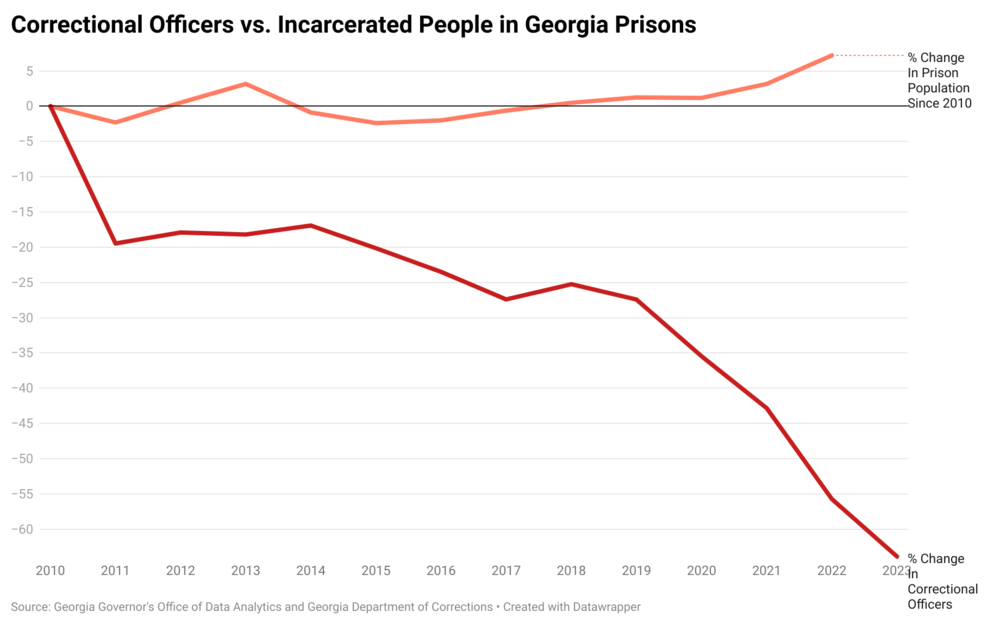Listen
Listening...
00:00
/
00:00
GPB's Peter Biello speaks with Brian Randolph, executive director of the Human and Civil Rights Coalition of Georgia, who has been tracking reports of deaths of incarcerated people.
LISTEN: GPB's Grant Blankenship reports on the latest number of prison deaths from the Georgia Department of Corrections.
—
In the last weeks of December, two incarcerated men were stabbed to death in Georgia's Central State prison. That brings the total deaths inside Georgia state prisons in the past month to six. According to data from the Department of Corrections, 2023 has been its most violent year since before the COVID-19 pandemic.
For a closer look at the contributing factors, GPB's Peter Biello spoke with Brian Randolph. He is the executive director of the Human and Civil Rights Coalition of Georgia and has been tracking reports of deaths of incarcerated people.
/
GPB's Peter Biello speaks with Brian Randolph, executive director of the Human and Civil Rights Coalition of Georgia, who has been tracking reports of deaths of incarcerated people.
Peter Biello: So when someone dies in prison, how does their loved one go about learning more about what happened?
Brian Randolph: Most of the time when someone dies in prison, their loved ones are left in the complete dark on what actually happened to their loved one or know the injuries that they sustained to cause their death. So there's not many questions that [are] answered when someone dies.
Peter Biello: And does your organization have more tools at its disposal to get answers from the Department of Corrections? And if so, when you learn something, what can you do with that info?
Brian Randolph: Well, we do. We use the open records request and we try to get the incident reports of the Department of Corrections narrative of exactly what happened. We share that information, what we learn from that report with their family members or loved ones and kind of let them go from there with the remedies that they want to use to maybe seek justice or something.
Peter Biello: Remedies like a civil lawsuit?
Brian Randolph: The civil lawsuit is the number one goal that families and loved ones go after after they found out exactly what happened.
Peter Biello: Mm hmm. State data showed that the Georgia Department of Corrections has one corrections officer for every dozen incarcerated people. Do you believe that that ratio has any bearing on the number of people who die in Georgia prisons?
Brian Randolph: Yes, I 100% do. That is a leading cause of violence. And we're seeing now, unfortunately, some inmates who are gang members. And you have the gangs actually now running these prisons because of the lack of staff that is a major problem at an almost every state prison in Georgia.

Peter Biello: So the Georgia Department of Corrections says when we talk about prison violence, it's important to understand that three quarters of people incarcerated in Georgia committed violent offenses. When the DOC says something like that, what do you think they're trying to say?
Brian Randolph: I guess they're trying to say that we locked up violent offenders. We took a violent offender off of the streets. So what do you expect for them to do while they're in our custody, in our care? You know, to continue their violent ways?
Peter Biello: Is there any legislation ready for the next legislative session that you think could make prisons a safer place?
Brian Randolph: I've not seen any. I know that there's a petition going around for a smart sentencing act, which is just going to target the first offenders, and I think also the nonviolent offenders, but I haven't read too much into that petition to really say much about it. But I do know that that's going to smart sentencing.

Peter Biello: Would that be in the vein of trying to keep nonviolent offenders out of prison?
Brian Randolph: From what I've read so far, that would be to keep them out of prison and to come up with different sentencing options for them. You have offenders that go in with very, very minor charges, which are felonies, [and] they also don't make it out alive. That's that's where we are now, where you have people that have short amount of time and their families are planning their funerals, unfortunately.
Peter Biello: What would you like to see happen in the legislative session that could improve things in prisons?
Brian Randolph: We have to tackle the prison conditions. They're horrific. We also have to tackle the administrative issues first so we can keep these people alive. Right now, they don't have the staff. They have to come up with a comprehensive plan to tackle their staffing issue. And I don't know if any legislation can do that. It's just the time that we live in, is that no one is going to or no one wants to work in corrections.